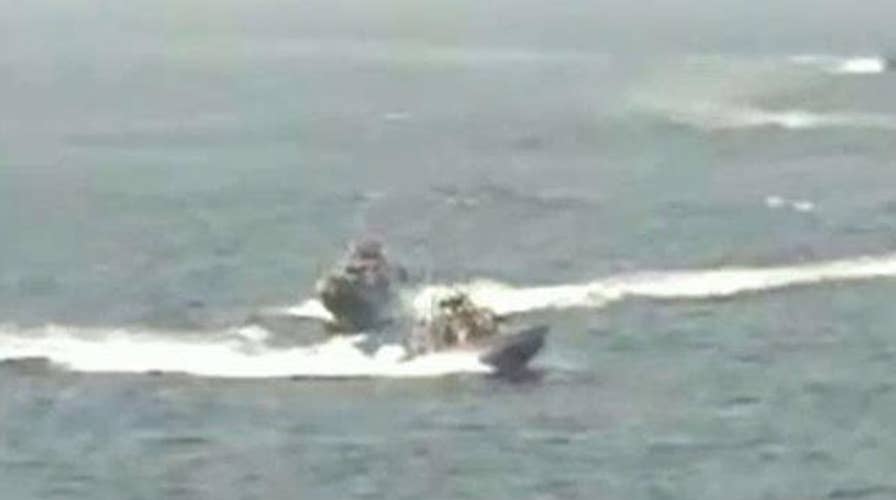Dangerous confrontations between Iranian and American warships in the Persian Gulf are up more than 50 percent in 2016 compared with this time last year, according to a U.S. defense official – despite the highly touted nuclear accord, as well as a recent $1.7 billion U.S. payment to Tehran.
The latest incidents of provocative Iranian behavior flared in the Persian Gulf earlier this week, including one filmed by the U.S. Navy. The video showed four Iranian gunboats from its Revolutionary Guard Corps coming within 300 yards of USS Nitze, an Arleigh Burke-class destroyer.
The incident was part of a troubling pattern, according to stats shared with Fox News.
In 2015, there were roughly 30 dangerous interactions between Iranian and U.S. Navy warships in the Persian Gulf, according to the U.S. Navy’s 5th Fleet. The Iranian vessels acted as the aggressors every time, the Navy says.
Yet already this year, that number is at least 30. Through the first six months alone of 2016, there were 26 dangerous confrontations that U.S. military officials called “unsafe and unprofessional.”
“We are on pace to exceed last year’s numbers by more than fifty percent,” the defense official told Fox News, while saying the confrontations have risen by that much so far.
Overall encounters involving Iran’s Revolutionary Guard Corps fleet of largely fast-boats also have increased significantly, corresponding to the spike in dangerous interactions.
In the incident captured on video – one of four such incidents this week – the U.S. destroyer fired flares, increased speed and took evasive maneuvers, while the Iranian ships ignored calls on the radio to stop. Cmdr. William Urban, a spokesman for the Navy’s 5th Fleet, called the actions “unsafe and unprofessional.”
The next day in a separate incident in the northern Persian Gulf, the USS Squall, a coastal patrol ship, fired three warning shots from its .50 caliber machine gun when one Iranian ship came within 200 yards.
This comes after Iranian gunboats from the IRGC in January seized 10 U.S. Navy sailors after their two patrol craft drifted into Iranian waters near Farsi Island in the Persian Gulf. They were released the following day.
In December, Iranian missile boats fired a burst of unguided rockets near a U.S. Navy aircraft carrier transiting the Strait of Hormuz. The Navy called the act “highly provocative” at the time.
Together, the incidents have stoked concerns that little has changed with Iran despite the nuclear accord.
“Iran’s behavior hasn’t significantly changed as a result of the nuclear agreement,” Gen. Joseph Votel told Fox News in Baghdad last month, while Fox News was traveling with the general responsible for American forces in the region.
During a visit to USS New Orleans, a Navy amphibious transport ship going through the Strait of Hormuz, an Iranian missile ship and three other fast-boats shadowed the U.S. warship with Votel and four reporters aboard, including Fox News.
“What concerns me is our people don’t always have a lot of time to deal with those interactions,” Votel said. “It’s measured in minutes to really have the opportunity to make the right decision.”
Meanwhile, the Wall Street Journal first reported that the U.S. paid Iran $400 million in January, as four Americans were being released from the country. The administration denied the money was ransom but conceded it was used as leverage to secure the release. Technically, the money was part of a $1.7 billion payment, apparently to resolve a longstanding financial dispute.
In July, two days before the one-year anniversary of the nuclear agreement, Iran also attempted to launch another ballistic missile in violation of a United Nations resolution. The launch, first reported by Fox News, failed after the missile exploded shortly after take-off according to U.S. defense officials. The missile was based on a North Korean BM-25 Musudan missile, which has a maximum range of nearly 2,500 miles, putting U.S. forces in the Middle East and Israel within reach, officials tell Fox News.
This week, Iranian Defense Minister Hossein Dehghan said his warships would continue to confront any U.S. Navy ship near Iran’s territorial waters.
“If an American ship enters Iran’s maritime region, it will definitely get a warning. We will monitor them and, if they violate our waters, we will confront them,” he said according to the Iranian Students’ News Agency.
Asked to respond to Dehghan’s comments at a press briefing Thursday, Pentagon Press Secretary Peter Cook said, “[W]e certainly hope it doesn't continue, because it serves no purpose other than to raise tensions in an important part of the world; and tensions that we don't seek to have escalated."
Iran’s defense minister is a former Iranian Revolutionary Guard Corps commander who plotted the 1983 the U.S. Marine barracks bombing in Beirut, killing 241 U.S. military personnel.
Earlier this week, the State Department put out a new travel warning to American citizens warning them about “the risk of arrest and detention of U.S. citizens” by Iran.





